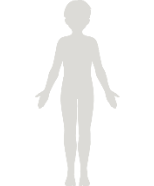Burden of disease
A COMPLEX AND DISABLING DISORDER
A COMPLEX AND DISABLING DISORDER
People diagnosed with Alexander disease progressively develop disabilities that may be severe, such as cognitive impairment and significant motor function issues.2,4,46
Progressive loss of mobility associated with motor manifestations of Alexander disease often necessitates the use of walking aids or wheelchairs.4,16 Supportive care is required for long-term disease manifestations, which can include1,8,17:
- Seizures
- Dysphagia
- GI symptoms
(eg, vomiting, reflux, constipation) - Poor weight gain
- Sleep apnea
- Autonomic dysfunction
(eg, urinary retention, orthostatic hypotension)
![A black and white photo of a person in a wheelchair with red wheels. [68]](/sites/default/files/2025-06/Mask%20Group%2027_0.png)

Impact on caregivers
Insufficient support for caregivers of children and adults with Alexander disease may negatively impact their quality of life and productivity.47 Challenges can include coordinating numerous medical appointments and obtaining necessary services, such as rehabilitation, school services, and home care support.47 Due to insufficient home care services, many caregivers are left with the responsibilities of providing constant care (ie, feeding, bathing, supervision) in addition to providing cognitive stimulation and performing rehabilitation exercises.47
Parents of children with leukoencephalopathies reported having to reduce work hours or quit their jobs to accommodate their child’s healthcare needs as a result of added caregiving responsibilities.47
Prognosis
Alexander disease is a progressive astrocytopathy that is ultimately fatal.2,32 The disease typically leads to death within 14 years in people with an earlier age of onset and within 25 years in those with a later age of onset; however, these findings are based upon small samples, and the disease course is seen as variable and unpredictable.2,4,33
The most common causes of death in people with Alexander disease include aspiration pneumonia and respiratory failure.4,48,49
Currently, no therapies exist that treat the underlying cause of Alexander disease, and treatment is primarily focused on symptomatic care.1,8,17 However, ongoing research and a clinical trial are exploring potential disease-modifying therapies.18,19
- Image

Some children have a survival time of 5 or fewer years,2 while others have survived for decades longer than published life expectancies2,48
- Image

In most people with a later age of onset, the disease progresses slowly, and people live with relative autonomy for many years; however, some people exhibit rapid progression, leading to fatality within a few years4
Prompt diagnosis of Alexander disease is critical to allow for earlier interventions that may reduce symptom severity and lessen disease burden.11,13